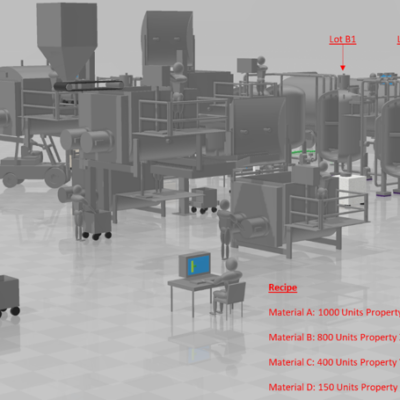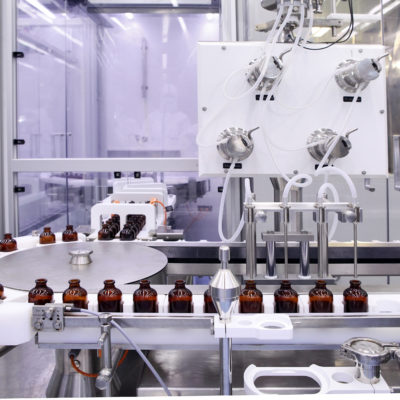News

Case Study: Product Life Expiration Automation
All the production processes carried out in a particular process cell within a large, national food manufacturing company, must adhere to certain time guidelines, a consequence of the relatively short shelf lives of some of the ingredients.
A batch process is monitored manually with operators following the batch through the stages and vessels involved. The production times are recorded on paper by an operator and tracked to ensure the time guidelines are maintained. The batching process at the various stages should not exceed the specified maximum time. Failure to meet these criteria will result in the product being scrapped. It is both difficult and cumbersome to reliably record and track the batch process creating the possibility for errors to occur. The food company sought a more reliable way to track the product life of the batches as well as providing information for quality control and regulatory purposes. The company requested ECS Solutions evaluate the possible automation of the time guidelines. ECS proposed a solution for the automation but limited it to the guidelines on the “in process batching” vessels. Automation of other vessels and guidelines could be carried out, but due to information available and a desire to minimize the scope, the project was limited to the in-process batching vessels. (more…)
Read More | Posted In: Case Studies, Food Industry, News
Batch Forensics: Additional Report Parameters Enhance Process Performance
 Understanding your process performance starts with having unambiguous data that is contextualized. This data provides information that quantifies and qualifies the different aspects that provide insight into the overall system performance. This data ends up in a repository and gets analyzed to produce actionable information and these reports may look at different aspects of the activities required to make products or to clean the equipment. By looking at the process from the ISA 88 and ISA95 point of view, we are able to provide additional context to the information for which the basic activities are reporting.
Understanding your process performance starts with having unambiguous data that is contextualized. This data provides information that quantifies and qualifies the different aspects that provide insight into the overall system performance. This data ends up in a repository and gets analyzed to produce actionable information and these reports may look at different aspects of the activities required to make products or to clean the equipment. By looking at the process from the ISA 88 and ISA95 point of view, we are able to provide additional context to the information for which the basic activities are reporting.
Additional information may be added to provide more insight into the activities related to:
- Quality – (amounts, tolerances, durations, temperatures, lethality, etc.)
- Cost- (materials, energy, personnel, equipment, etc.)
- Material information – (lot ID, material properties, storage locations, etc.)
- Personnel – (who is performing tasks, signoffs, etc.)
- Energy – (transport, heat/cool, mix, etc.)
- Equipment – (raw material source, equipment utilization, portable equipment information.)
– as well as other aspects that can be used to make informed decisions. (more…)
Read More | Posted In: Bakery Industry, Beverage Industry, Blogs, Chemical Industry, Food Industry, Life Science Industry, Metals

Batch Forensics: The Case of the FactoryTalk Batch Timers
Frequently, we hear new and seasoned engineers say they do not use the Rockwell FactoryTalk Batch (FTBatch) Standard timers ($timer) because they cannot interact with them or can’t tell what the timer’s status is, as they do with controller-based timers. However, our Batch Forensic experts explain that this is not the case.
Standard Recipe timers require no design, implementation, testing, commissioning nor validation as required by timer Phases implemented in the controllers. Standard recipe $timers can be applied at all levels of the procedural model (Procedures, Unit Procedures, and Operations) Standard $timers can be used in as many placed as required, each instance of the timer is given a name defined by the recipe author that can be associated with the activity at hand. Timers are automatically added to the units configured on the area model just like the $Null Phase.
Read More | Posted In: Bakery Industry, Beverage Industry, Blogs, FactoryTalk Batch, Food Industry, Life Science Industry

Batch Forensics by ECS Solutions
The term forensics refers to the application of scientific knowledge to problems, especially scientific analysis, and data analysis of physical evidence. In a plant environment, data and scientific analysis can be the key to discovering opportunities to improve the automation solution that exists, forensic tools can be implemented in all phases of the life cycle of a system, but ideally, they should be considered during the design phase.
Read More | Posted In: Bakery Industry, Beverage Industry, Blogs, Chemical Industry, Distilleries, Food Industry, Life Science Industry, Metals

JTM Foods Case Study
JTM Foods challenged ECS Solutions and Blentech to create a SCADA system that included the full spectrum of process automation for their new state-of-the-art production facility. JTM wanted to expand their production capability with a new state-of-the-art facility featuring a Process Automated Kitchen. They wanted to track their process from the ERP Order through the procedural execution of the receipt and material tracking to a finished product. There were multiple solutions evaluated for each of the key aspects, via different islands of software. JTM operates efficiently with a very lean, experienced workforce, however, they prefer to minimize the requirements to support and sustain multiple technology platforms.
Read More | Posted In: Case Studies, Food Industry, SCADA

Dosing Materials Based On Their Properties
Improving Product Quality
Often the quantities of materials required to manufacture a product are specified by weight or by volume. Recipes and procedures are created to specify the activities that need to be performed and the number of materials required.
The Setpoints for these quantities are set in the recipes based on the materials that are being used, if the material properties change significantly then these recipe quantities need to be updated once the new materials enter the production stream. This often requires tracking the material consumptions and updating the recipes at the appropriate time. i.e. late at night on Saturday once the new material is introduced to the production environment.
These new formula quantities are calculated after a lab analysis is performed of each Lot sample. The timing to introduce these new recipe parameter values can be critical to the Quality and the Cost of the product.
Read More | Posted In: Bakery Industry, Batch Boosters, Beverage Industry, Chemical Industry, Distilleries, Food Industry, Life Science Industry, White Papers

Boosting Batch Performance at a Salad Dressing Plant
A well-known line of salad dressings was recently acquired by a major food manufacturer with the plan to establish a fully automated, paperless manufacturing process for the production. To do this efficiently and cost-effectively
represented a significant challenge.
Read More | Posted In: Case Studies, FactoryTalk Batch, Food Industry

Documenting Your Manufacturing Ecosystem
Understanding your manufacturing ecosystem is one thing, but documenting it is just as important. Having extensive documentation of the manufacturing ecosystem, helps those who aren’t involved in daily, plant-floor operations make informed decisions. Your manufacturing ecosystem is the system you use for making your product(s), and fully documenting and understanding this ecosystem will help the decision-making process of your organization.
Read More | Posted In: Bakery Industry, Beverage Industry, Blogs, Chemical Industry, Distilleries, Food Industry, Life Science Industry

Material Dosing Geneology
The Food industry uses batch manufacturing extensively and therefore requires traceability for material ingredients, i.e. the ability to follow the movement of a food product and its’ constituents all through the production process.
This capability not only largely prevents unsafe foods from reaching the consumer but also improves product quality and efficiency in the event of a recall.
Read More | Posted In: Bakery Industry, Batch Boosters, Beverage Industry, Chemical Industry, Distilleries, Food Industry, Life Science Industry, White Papers

The Benefits of Off-The-Shelf SOP Management Software
Being able to keep track of every step and every bit of data is a major necessity for every organization. An off-the-shelf standard operating procedure software is one way to implement new processes and keep track of business operating standards.
Tracking manual operations in discrete, batch, and continuous manufacturing processes can greatly benefit from off-the-shelf products. Clearly specifying your procedures, enforcing their execution, and capturing pertinent data are all major benefits that can be quickly and easily be obtained by implementing off-the-shelf, procedure management software.
Read More | Posted In: Bakery Industry, Beverage Industry, Blogs, Chemical Industry, Distilleries, Food Industry, Life Science Industry
